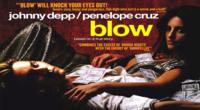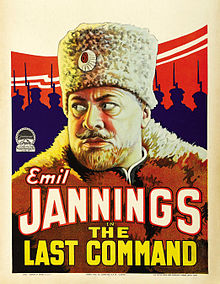The Last Command is a 1928 silent film directed by Josef von Sternberg, and written by John F. Goodrich and Herman J. Mankiewicz from a story by Lajos Bíró. Star Emil Jannings won the first Academy Award for Best Actor in a Leading Role for his performances in this film and The Way of All Flesh, the only year that multiple roles were considered. In 2006, the film was deemed "culturally, historically, or aesthetically significant" by the United States Library of Congress and selected for the National Film Registry. The supporting cast includes Evelyn Brent and William Powell.
| The Last Command | |
|---|---|
| Directed by | Josef von Sternberg |
| Produced by | Adolph Zukor Jesse L. Lasky |
| Written by | John F. Goodrich Lajos Bíró (story) Josef von Sternberg (story) Herman J. Mankiewicz (titles) |
| Starring | Emil Jannings Evelyn Brent William Powell |
Production company | Paramount Famous Lasky Corp. |
| Distributed by | Paramount Pictures |
Release date |
|
Running time | 85 minutes |
| Country | United States |
| Language | silent English intertitles |
Screenplay
In 1928 Hollywood, director Leo Andreyev (William Powell) looks through photographs for actors for his next movie. When he comes to the picture of an aged Sergius Alexander (Emil Jannings), he pauses, then tells his assistant (Jack Raymond) to cast the man. Sergius shows up at the Eureka Studio with a horde of other extras and is issued a general's uniform. As he is dressing, another actor complains that his continual head twitching is distracting. Sergius apologizes and explains that it is the result of a great shock he once experienced.
The film then flashes back ten years to Czarist Russia, which is in the midst of the Revolution. Grand Duke Sergius Alexander, the Czar's cousin and commander of all his armies, is informed by his adjutant that two actors entertaining the troops have been identified as dangerous "revolutionists" during a routine passport check. He decides to toy with them for his amusement. When one of them, Leo Andreyev, becomes insolent, Sergius whips him across the face and has him jailed.
Leo's companion, the beautiful Natalie Dabrova (Evelyn Brent), is an entirely different matter. She intrigues Sergius. Despite the danger she poses, he takes her along with him. After a week, he gives her a pearl necklace as a token of his feelings for her. She comes to realize that he is at heart a man of great honor who loves Russia as deeply as she does. When she invites him to her room, he spots a partially hidden pistol, but deliberately turns his back to her. She draws the weapon, but cannot fire. Despite their political differences, she has fallen in love with him.
When the Bolsheviks capture the train on which they are traveling, she pretends to despise him. Instead of having him shot out of hand like his officers, she suggests they have him stoke coal into the locomotive all the way to Petrograd, where he will be publicly hanged. When everyone is drunk, however, she helps him escape, giving him back the pearl necklace to finance his way out of the country. Sergius jumps from the train, then watches in horror as it tumbles off a nearby bridge into the icy river below, taking Natalie with it. This moment is when Sergius develops his head twitch.
Ten years later, Sergius is reduced to poverty, eking out a living as a Hollywood extra. When he and the director finally meet, Sergius recognizes him. Leo, in an ironic act calculated to humiliate him, casts him as a Russian general in a battle scene. He is directed to give a speech to a group of actors playing his dispirited men. When one soldier tries to incite a mutiny, telling the general that "you've given your last command", he whips the man in the face as instructed, just as he had once struck Leo. Losing his grip on reality, he imagines himself genuinely on the battlefield, besieged by enemies, and passionately urges his men to fight for Russia. Overstraining himself, he dies, inquiring with his last words if they have won. Moved, Leo tells him they have. The assistant remarks, "That guy was a great actor." Leo replies, "He was more than a great actor - he was a great man."
- Emil Jannings as Grand Duke Sergius Alexander
- Evelyn Brent as Natalie "Natacha" Dabrova
- William Powell as Leo Andreyev
- Jack Raymond as the Assistant Director
- Nicholas Soussanin as the Adjutant
- Michael Visaroff as the Bodyguard
- Fritz Feld as A revolutionist.
Proving the Hollywood adage that movie directors are "only as good as their last picture", Sternberg was given a free hand by Paramount when Underworld (1927) proved to be "an instant success".
The following three years would witness the industry-wide transition from silent to sound technology, during which Sternberg completed The Last Command (1928), The Drag Net (1929) and The Case of Lena Smith (1929) , his last silent works, and his first talkie, Thunderbolt, in 1929. Though these films would be praised by critics for their distinct style, none would achieve great box-office success.
Before embarking on The Last Command, Paramount tasked Sternberg with editing portions of director Erich von Stroheim’s The Wedding March (1928), as well as writing the screenplay for director Mauritz Stiller’s The Street of Sin.
Ernst Lubitsch told newspaper columnist Gilbert Swan that the background story for The Last Command had a real-life inspiration: a General in the Imperial Russian Army named Theodore A. Lodigensky whom Lubitsch had met in Russia, and again in New York, where he had opened a Russian restaurant after fleeing the communist revolution. Lubitsch encountered the ex-general once more, when the latter appeared in full uniform looking for work as an extra at $7.50 a day, the same rate as Sergius. Lubitsch later told Lajos Bíró the anecdote. Under the name Theodore Lodi, Lodigensky went on to play a handful of roles between 1929 and 1935, including Grand Duke Michael, a Russian exile who is forced to work as a hotel doorman in the 1932 film Down to Earth.
In 1927, Paramount’s sister film company in Germany, Ufa, yielded its foremost actor Emil Jannings and producer Erich Pommer to make a number of movies in Hollywood. Sternberg and Jannings had established a friendly rapport when they met in Berlin in 1925.
Jannings would star in director Ernst Lubitsch’s The Patriot and in Victor Fleming’s The Way of All Flesh, but his outstanding performance in The Last Command would surpass these two productions.
The source of the script for the film has been termed “somewhat controversial”. Paramount attributed the original story entitled “The General” to screenwriter Lajos Bíró, the scenario to John S. Goodrich, and the titles to Herman J. Mankiewicz. Nevertheless, Sternberg’s significant additions and alterations to the plot are “incontestable” and form the basis of his claim to “ultimate authorship” of this cinematic "masterpiece."
The Last Command was among “the most ambitious Sternberg ever shot” and remarkably, the shooting was completed in five weeks.
The release of The Last Command was stalled when Paramount executives reviewed the film and discovered that Sternberg had inserted material portraying Hollywood as heartless and cynical. They further complained that he had historically misrepresented the Russian Revolution, including "recognizable portraits of Trotsky and the young Stalin. Only under duress from a wealthy Paramount stockholder did the studio relent and distribute the film. This would be the "only time in his career that Sternberg confronted his own craft as a subject."
Despite opening to “remarkable critical success” and eliciting “ecstatic reviews”, the box-office profits never materialized.
American playwright and filmmaker Preston Sturgis declared The Last Command "perhaps the only perfect picture he had ever seen."
Despite its "commercial failure" the movie garnered a nomination for Best Original story, and Emil Jannings took the Oscar for best Best Performance at the 1st Academy Awards.
Author and film critic Leonard Maltin awarded The Last Command four out of four stars, calling it "A fascinating story laced with keen perceptions of life and work in Hollywood.
The themes presented in The Last Command reflect Sternberg’s obsession as a film poet, exhibiting “a continuous stream of emotional autobiography” and “ most strikingly defines the importance for Sternberg of the intertwined themes of desire, power and instability of identify.”
Jannings’ General Sergius Alexander, an imperious member of the Russian Czar’s royal family, is punished for his arrogance – not once, but twice: first stripped of prestige and power by the Bolshevik Revolution, and then reduced to a Hollywood extra performing a burlesque of his former stature. Flashback sequences reveal his precipitous descent, a fate that provided Jannings with the opportunity to exhibit “the extremes of his talent.”
In this “saga of decline and fall” – the most "Pirandellian" of Sternberg’s films – the characters engage in a “desperate struggle for psychic survival grants them a measure of heroic stature and stoic calm.”
In a “performance of remarkable depth”, Evylen Brent’s Bolshevik Revolutionary Natacha Dabrova develops “a relationship with Jannings as complex as anything in modern cinema.” On Sternberg’s handling of Brent’s Natacha, Film historian Andrew Sarris wrote: “, like all Sternbergian women, remains enigmatic beyond the demands of the plot. Her perverse nature operates beyond good and evil, beyond the convenient categories of virgins and vamps. What is unusual about Sternberg’s direction is that…he seeks to control performances not for the sake of simplicity, but for the sake of complexity.”
Sarris concludes his thematic analysis with this paradox:
”...It becomes impossible to tell what The Last Command means…The personal, the political, the asthetic are all intertwined influences for Sternberg. We are left with no moral, no message, but only a partially resolved melodrama of pride and punishment, a work of art rich in overtones but pitched at too many different keys of interpretation. As a stylistic exercise, The Last Command is almost too much of a good thing.”
Home media
In 2010, The Criterion Collection released a DVD set of three von Sternberg films: The Last Command, Underworld and The Docks of New York.

Request Movie Now
Watch movie The Last Command 1928 Film online on Amazon
Watch movie The Last Command 1928 Film online
Watch The Movie On PrimeSubhayathra Full HD Movie Download

Aaja Meri Jaan Full HD Movie Download

Main Aurr Mrs Khanna Full HD Movie Download

Dharam Veer Full HD Movie Download

Taal Full HD Movie Download

Paisa Ya Pyar Full HD Movie Download

Qaid Mein Hai Bulbul Full HD Movie Download

Humko Deewana Kar Gaye Full HD Movie Download

Elaan (1971) Full HD Movie Download
.jpg)
Ayyapa Swami Janma Rahasym Full HD Movie Download

Sri Raja Rajeshwari Full HD Movie Download

Khaidi Inspector Full HD Movie Download

Kalasi Unte Kaladu Sukham Full HD Movie Download

Blow Full HD Movie Download

The Godman Full HD Movie Download

Bharatamlo Arjunudu Full HD Movie Download

Nelavanka Full HD Movie Download

Swayamvaram Full HD Movie Download

Guna Sundari Katha Full HD Movie Download

New York Full HD Movie Download

Badmaash Company Full HD Movie Download

Download latest Movie from bollywood
- 1> baaghi 3
- 2> THE SKY IS PINK MOVIE FULL STORY AND REVIEW
- 3> Luka Chuppi
- 4> TO ALL THE BOYS I’VE LOVED BEFORE
- 5> Kabir Singh
- 6> Street Dancer 3D
- 7> Simmba
- 8> Gone Girl
- 9> The Girl Who Lived
- 10> Ludo
- 11> DILWALE DULHANIA LE JAYENGE
- 12> GUILTY
- 13> The Godfather
- 14> Adventures of Rusty
- 15> Sooryavanshi
- 16> Satyameva Jayate 2
- 17> Thappad
- 18> Bhool Bhulaiyaa 2
- 19> KGFChapter 2
- 20> Mardaani 2
- 21> Pinjar
- 22> Shivaji maharaj
- 23> Ek Villian 2
- 24> Hungama 2
- 25> Divergent
- 26> Mumbai Saga
- 27> The Internship
- 28> HIT (telugu)
- 29> Panga
- 30> The perfect date
- 31> 16 December
- 32> Gopala Gopala (Telugu)
- 33> Brahmastra
- 34> Gangubai Kathiawadi
- 35> Manmadhudu
- 36> Nenu local
- 37> Mahanati
- 38> Shatamanam bavathi
- 39> Lagaan
- 40> After
- 41> MOM
- 42> Shamshera
- 43> Raguvaran BTech
- 44> Khakee
- 45> The villain
- 46> OM
- 47> Mr. perfect
- 48> Bueatifull mind
- 49> Hichki
- 50> Gabbar Singh
- 51> Jogi
- 52> Before Sunrise
- 53> Before Sunset
- 54> Before Midnight
- 55> The Big Bull
- 56> Top Gun: Maverick
- 57> The Purge
- 58> The Sky is Pink
- 59> Laxmmi Bomb
- 60> Sadak 2
- 61> Sufna
- 62> Prithviraj
- 63> PK
- 64> Coolie No 1(2020)
- 65> Black Widow
- 66> Dear Zindagi
- 67> Dil Bechara
- 68> PHIR HERA PHERI
- 69> WAR
- 70> Dostana
- 71> RRR: Roudram Ranam Rudhiram
- 72> Maidan
- 73> Dabbang 3
- 74> Chhalaang
- 75> life as we know it
- 76> SherShaah
- 77> Sandeep Aur Pinky Faraar
- 78> Event Horizon
- 79> 83
- 80> Radhe: Your Most Wanted Bhai
- 81> Gunjan Saxena: The Kargil Girl
- 82> Mr India
- 83> Vivah
- 84> Anokha Bandhan
- 85> Ghost
- 86> Bhoot: Part One - The Haunted Ship
- 87> Haseen Dilruba
- 88> Laal Singh Chaddha
- 89> Qismat
- 90> Rajput
- 91> Drive
- 92> Dil Chahta Hai
- 93> Dil Ki Baazi
- 94> Dil Ka Rishta
- 95> Teesri Manzil
- 96> Dil
- 97> Love Aaj Kal
- 98> Khaali Peeli
- 99> Bunty Aur Babli 2
- 100> Atrangi Re
- 101> Gulabo Sitabo
- 102> Jodi
- 103> Suraj Pe Mangal Bhari
- 104> Deewana
- 105> Attack
- 106> Sardar Udham Singh
- 107> Toofan
- 108> THE LOVEBIRDS
- 109> Jersey
- 110> Ginny Weds Sunny
- 111> Thalaivi
- 112> Shiddat
- 113> Angels vs Zombies
- 114> Koi Mil Gya
- 115> Thank God
- 116> Bhuj: The Pride of India
- 117> Hum Aapke Hain Kaun
- 118> The Platform
- 119> Bird Box
- 120> Roohi Afzana
- 121> Torbaaz
- 122> Nikamma
- 123> World War Z
- 124> Extraction
- 125> Train to Busan
- 126> Life of Pi
- 127> SHAADI MEIN JROOR AANA
- 128> Himmat Aur Mehnat
- 129> To All The Boys: P.S. I Still Love You
- 130> Mimi
- 131> Good Newwz
- 132> Shubh Mangal Zyada Saavdhan
- 133> Raabta
- 134> Harry Potter and the Philosopher's Stone
- 135> Harry Potter and the Chamber of Secrets
- 136> Chhapaak
- 137> War of the Worlds
- 138> Harry Potter and the Prisoner of Azkaban
- 139> Harry Potter and the Goblet of Fire
- 140> MURDER MYSTERY
- 141> Shakuntala Devi
- 142> Bachchan Pandey
- 143> Jayeshbhai Jordar
- 144> Sheer Qorma
- 145> Saina
- 146> 'O' Pushpa I hate tears
- 147> Kedarnath
- 148> MS Dhoni The Untold Story
- 149> Chhichhore
- 150> Badhaai Ho
- 151> Unstoppable
- 152> Oz the Great And Powerful
- 153> The Girl on the Train
- 154> Haathi Mere Saathi 2020
- 155> The Conjuring: The Devil Made Me Do It
- 156> Gandhi Se Pehle Gandhi
- 157> The Song of Scorpions
- 158> Srimanthudu
- 159> Hello Guru Prema Kosame
- 160> Beauty and The Beast
- 161> Black Panther
- 162> Charlie and the Chocolate Factory
- 163> Bole Chudiyan
- 164> Fidaa
- 165> Duvvada Jagannadham
- 166> Bruce Lee: The Fighter
- 167> Hyper
- 168> Yaara
- 169> Red (2020)
- 170> Shivam
- 171> That Is Mahalakshmi
- 172> Nishabdham
- 173> Aashram 2020 web series
- 174> Laxmii
- 175> Mismatched
- 176> STUDENT OF THE YEAR 2
- 177> NAIL POLISH
- 178> Ramprasad Ki Tehrvi
- 179> KAAGAZ
- 180> 12 o Clock
- 181> The Power
- 182> bolo hau
- 183> Tribhanga
- 184> JAMUN
- 185> Madam Chief Minister
- 186> Maasaab
- 187> Aadhaar
- 188> Tanhaji
- 189> Bhaagi 3
- 190> Bhootnath
- 191> MALANG
- 192> Jai Mummy Di
- 193> Haathi Mere Saathi 2021
- 194> Shakeela
- 195> Unpaused
- 196> Annayya
- 197> Vamsoddharakudu
- 198> Mrugaraju
- 199> Narasimha Naidu
- 200> Sankranti
- 201> Manasu Maata Vinadhu
- 202> Anjaane
- 203> Apaharan
- 204> Bachke Rehna Re Baba
- 205> Bewafaa
- 206> Roohi
- 207> Radhe
- 208> Zindagi Khoobsoorat Hai
- 209> Yeh Mohabbat Hai
- 210> Yeh Kya Ho Raha Hai?
- 211> The Tomorrow War
- 212> DehradunDiary
- 213> Meri Shaadi Karaoo
- 214> Matruu Ki Bijlee Ka Mandola
- 215> No One Killed Jesica
- 216> Aag Ka Goola
- 217> Eight Million Dollars
- 218> Three Hundred
- 219> Cats and Dog
- 220> Decoy
- 221> Gold Rush
- 222> You Have Got Mail
- 223> Final Destination three
- 224> Tofan
- 225> Jungle
Request for Download movie The Last Command 1928 Film
- Bollywood movies
- Latest Bollywood movies
- Download all bengali movies
- Download all bhojpuri movies
- Download all english movies
- Download all gujarati movies
- Download all hindi movies
- Download all kannada movies
- Download all malayalam movies
- Download all marathi movies
- Download all oriya movies
- Download all punjabi movies
- Download all tamil movies
- Download all telugu movies
- Bollywood action movies
- Bollywood adventure movies
- Bollywood animation movies
- Bollywood classical movies
- Bollywood comedy movies
- Bollywood crime movies
- Bollywood devotional movies
- Bollywood documentary movies
- Bollywood drama movies
- Bollywood family movies
- Bollywood fantasy movies
- Bollywood historical movies
- Bollywood history movies
- Bollywood horror movies
- Bollywood musical movies
- Bollywood mystery movies
- Bollywood mythological movies
- Bollywood patriotic movies
- Bollywood romance movies
- Bollywood romantic movies
- Bollywood sci-fi movies
- Bollywood social movies
- Bollywood spiritual movies
- Bollywood sports movies
- Bollywood suspense movies
- Bollywood thriller movies
- Bollywood war movies
- Hot actress list
- Hot gujarati actress list
- Hot tamil actress list
- Hot bhojpuri actress list
- Hot assam actress list
- Hot bihari actress list
- Hot jammu and kashmir actress list
- Hot gujarati actress list
- Hot haryana actress list
- Hot konkani actress list
- Hot marathi actress list
- Hot odia actress list
- Hot punjabi actress list
- Hot rajasthani actress list
- Hot kannada actress list
- Hot malayalam actress list
- Hot telugu actress list
- Hot tulu actress list
- Hot Actress list from Indian city
- Hot actress list from ahmedabad
- Hot actress list from alappuzha
- Hot actress list from bangalore
- Hot actress list from bangalore
- Hot actress list from bhopal
- Hot actress list from chandigarh
- Hot actress list from chennai
- Hot actress list from guwahati
- Hot actress list from hyderabad, india
- Hot actress list from indore
- Hot actress list from jaipur
- Hot actress list from kannur
- Hot actress list from kochi
- Hot actress list from kolkata
- Hot actress list from kollam
- Hot actress list from kottayam
- Hot actress list from kozhikode
- Hot actress list from lucknow
- Hot actress list from madurai
- Hot actress list from mangalore
- Hot actress list from mumbai
- Hot actress list from mysore
- Hot actress list from new delhi
- Hot actress list from patna
- Hot actress list from pune
- Hot actress list from thiruvananthapuram
- Hot actress list from thrissur
- Hot actress list from tiruchirappalli
- Hot actress list from vijayawada
- Hot actress list from visakhapatnam
- All Bollywood Movies
- Bollywood Celeb
- >Art Director
- >Audiography
- >Background Music
- >Banner
- >Choreographer
- >Cinematographer
- >Costume Designer
- >Dialogue Writer
- >Director
- >Distributor
- >Editor
- >Executive Producer
- >Hair Stylist
- >Lyricist
- >Music Director
- >Photographer
- >Playback Singers
- >Presenter
- >Producer
- >Production Company
- >Production Designer
- >Screenplay
- >Singer
- >Sound
- >Actor
- >Story Writer
- >Studio
- >Video Director
- >Miscellaneous
- >Publicity (pro)
- >Web Creator
- >Production Labs
- >Publicity Design
- >Publicity Stills
- >Writer
- >Miscellaneous Artists
- >Visual Effects
- >Reporter
- >Music Company
- >Shooting Studios
- >Picturised On
- >Line Producer
- >Co Producer
- >Asst Director
- >Casting Director
- >Cinematography
- >Choreography
- >Dialouge
- >Editing
- >Lyrics
- >Music
- >Story
- >Playback Singer Female
- >Playback Singer Male
- >Actor In A Comic Role (male/female)
- >Child Artiste
- >Ensemble Cast
- >Actor Popular Choice (male)
- >Actor Popular Choice (female)
- >Sa Re Ga Ma Pa Song Of The Year
- >Actor In Supporting Role
- >Actress In Supporting Role
- >Actor In Leading Role
- >Art Direction
- >Actress In Leading Role
- >Sound Recording
- >Costume Design
- >Special Effects
- >Action
- >Actor In A Negative Role
- >Lifetime Achievement Award
- >Cinematic Exellence (director)
- >Cinematic Exellence (male)
- >Cinematic Exellence (female)
- >International Male Icon
- >International Female Icon
- >Actor In A Supporting Role (male)
- >Actor In A Supporting Role (female)
- >Actor In A Comic Role
- >Playback Singer (male)
- >Playback Singer (female)
- >Most Promising Debut (female)
- >Most Promising Debut (male)
- >Most Promising Director
- >Sound Design
- >Lifetime Jodi
- >Marketed Film
- >Jury Award For Best Actor
- >Jury Award For Best Actress
- >Jury Award For Best Film
- >Jury Award For Best Director
- >Playback Singer(male)
- >Lifetime Acheivement Award (male)
- >Excellence Award
- >Jodi Award
- >Performer Of The Year
- >Presented By
 Story of movie The Last Command 1928 Film :
Story of movie The Last Command 1928 Film :